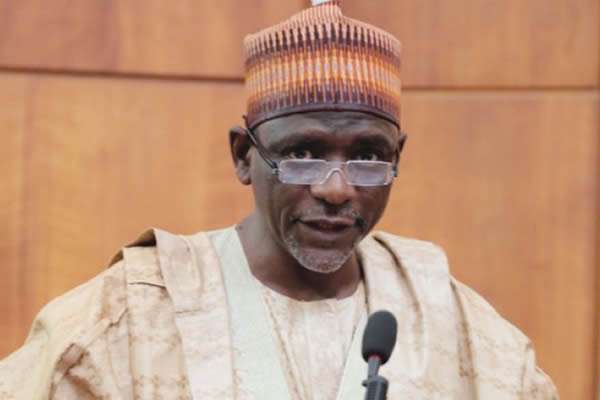News
Minister says Qualitative Education is Tied to ICT Development

Mallam Adamu Adamu, Minister of Education, says the qualitative education in the modern world was intrinsically tied to the development and deployment of ICT in education.
The Minister who was represented by the Director, ICT, Federal Ministry of Education, Mr Ifegwu Orji during the inauguration of the Unites Cisco Internet of Things (IoT) Innovation Centre at Queens College in Yaba said: ”ICT as an enhancer of education has transformed education delivery from being the transmission of information by the teacher as the custodian of knowledge to the learner as the receiver of the knowledge transmitted and the school, from being a teacher-centered agency.”
He said: “Today, teachers are seen as facilitators or coaches of learning or in some cases, as change agents or activators and the students as active partners in learning.
”The school also had become an open space for learners who initiate and acquire their own learning and expand their knowledge through interaction among themselves and with the teachers.
“This kind of interaction is only made easier by the Internet of Things as it connects people, processes devices and data.
According to him, with the Internet of Thing (IoT), more engaging and measurable method of education that can provide knowledge to a greater number of students in a manner that fits their learning styles and needs are enhanced. He explained that The Internet of Thing (IoT), refers to the ever-growing network of physical objects with IP address for internet connectivity and communication that occurs between them and other internet-enabled devices.
His word: “It also enhances the volume and values of information that can be collected, thus, allowing educators and administrators to turn data into actionable insight like never before envisaged.
“In order to demonstrate our commitment towards the delivery of qualitative education with the resultant production of the requisite manpower, that can survive in the modern society, contributions to sustainable national development and compete globally, we have approved the establishment of the Cisco Unites IoT Innovation Centres in six Federal Unity Colleges in the six geo-political zones for the 2017/2018 academic session for which we are here today.
“Some of the Unity colleges that have benefitted from this project are Federal Science and Technical College Yaba as pilot, Federal Government Girls College Buari in Abuja, Federal Government College Kano and Queens College Lagos, as well as Federal Government College Enugu among others.
“They will all serve as a hub for open innovation to showcase what is with digital transformation and Internet if Things in education.
“We have also approved the establishment of the Cisco network academy in all the unity colleges under Cisco’s corporate social responsibility (CRS) in the education sector and other Cisco long term CRS programnes.
“It is our hopes that these programmes will fast track the achievement of ICT-enhanced education and would empower our students and teachers to adapt to the rapidly changing knowledge requirements and skills.
The Minister maintained that the goal of the Federal Government is to see the education sector as a whole, embrace the use of new technologies to meet the human resources requirements of nation-building for the attainment of sustainable soci-economic development.
He posited that government was optimistic of enhancing the sector for global competitiveness as well as the individual’s ability to survive in the contemporary society.
While lauding the partnership and contribution of Cisco Unites Academy for their support and donation of the IoT centres to the colleges, he added that the gesture would further boost students learning.
Meanwhile, the Director, of the Unites Networking Academy, Mr Toyin Olatayo, on his part said that the inauguration of the IoT project in Queens college was the third in the series.
According to him, efforts were underway to replicate same in all the 104 unity colleges across the country in two years. Olatayo noted that rapid changes in technology trends are forcing humans to keep up in order to stand the chance of surviving in a competitive world.
He maintained that technology has, and would continue to transform every aspect of human lives, be it education, governance, business and even personal relationships.
“There is digital transformation across countries and companies. Digital transformation driving opportunities. We want to bridge opportunities between students and the digital economy,” Olatayo said.
He added that the objectives of the Unites Cisco IoT Innovation Centre were to create technology solutions to unlock opportunities at a speed of rapid prototyping.
News
DHQ Indicts Brigadier General Abubakar Sadiq, 15 Others in Alleged Coup Plot againt Tinubu

Defence Headquarters (DHQ) has made public the full names of 16 officers of the Armed Forces of Nigeria indicted by a Special Investigative Panel over alleged serious misconduct, including an alleged coup plot against President Bola Tinubu.

The officers suspected to be involved in the coup plot include a brigadier general, a colonel, four lieutenant colonels, five majors, two captains, a lieutenant, a lieutenant commander and a Squandron Leader.
Major General Samaila Uba, director of Defence Information, disclosed this on Monday, stating that the panel had concluded its investigation and established that the affected officers had cases to answer.
According to him, the indicted officers will face a military Court Martial in line with established procedures and existing regulations.
Major Gen. Uba said the probe examined the circumstances surrounding the conduct of the officers and identified actions “inconsistent with the ethics, values and professional standards expected of members of the Armed Forces of Nigeria.”
He stressed that the exercise was purely disciplinary and aimed at preserving internal discipline, cohesion and operational effectiveness, adding that the Armed Forces remain loyal to the Constitution and Nigeria’s democratic order.
- Brigadier General Musa Abubakar Sadiq (Nasarawa, 44th Regular Course)
- Colonel M. A. Ma’aji (Niger, 47th Regular Course)
- Lieutenant Colonel S. Bappah (Bauchi, 56th Regular Course)
- Lieutenant Colonel A. A. Hayatu (Kaduna, 56th Regular Course)
- Lieutenant Colonel Dangnan (Plateau, 56th Regular Course)
- Lieutenant Colonel M. Almakura (Nasarawa, 56th Regular Course)
- Major A. J. Ibrahim (Gombe, 56th Regular Course)
- Major M. M. Jiddah (Katsina, 56th Regular Course)
- Major M. A. Usman (Federal Capital Territory, 60th Regular Course)
- Major D. Yusuf (Gombe, 59th Regular Course)
- Major I. Dauda (Jigawa, DSSC 38)
- Captain I. Bello (DSSC 43)
- Captain A. A. Yusuf
- Lieutenant S. S. Felix (DSSC)
- Lieutenant Commander D. B. Abdullahi (Nigerian Navy)
- Squadron Leader S. B. Adamu (Nigerian Air Force)
News
Court Fines Airtel N210m for Unauthorised Use of ‘Nigeria Go Survive’ Song

Justice Ibrahim Ahmad Kala of the Federal High Court, Lagos, on Monday awarded a total of N210 million in damages against Airtel Networks Limited for copyright infringement arising from the unauthorised use of a musical work titled “Nigeria Go Survive.”

The award comprises N200 million as general damages and N10 million as costs.
In addition to the monetary award, the court issued mandatory and perpetual injunctions restraining Airtel, its management, agents, servants, privies, successors-in-title and assigns from reproducing or further using the musical work, or any substantial part of it, for advertising, promotion, telemarketing, or other business purposes without the licence or authorisation of the copyright owner.
Justice Kala specifically ordered Airtel to remove “Nigeria Go Survive” from its list of songs used for advertising, business, telemarketing and promotional purposes across its network with immediate effect.
The judge held that Airtel’s use of the song without licence or authorisation amounted to restricted acts under the Copyright Act and constituted an infringement of the plaintiff’s copyright.
The judgment was delivered in suit No: FHC/L/CS/1822/2022, filed by Veno Marioghae Mbanefo, producer of the song.
In resolving the sole issue for determination, the court held that the plaintiff proved her case on the balance of probabilities.
Justice Kala noted that a perpetual injunction is granted after infringement has been established and is intended to protect the proprietary rights of the copyright owner and restrain continued infringement.
Accordingly, the court made the following orders: “That Airtel’s unauthorised use of “Nigeria Go Survive” for advertising, promotion and telemarketing amounts to copyright infringement.
“Mandatory injunction prohibiting Airtel from reproducing or using the musical work, or any substantial part of it, for business and promotional purposes.
“Perpetual injunction restraining Airtel from any further unauthorised use of the work.
“General damages N200 million awarded to the plaintiff for losses suffered as a result of the infringement. And N10 million awarded in favour of the plaintiff, considering the duration of the case, legal representation, expenses incurred, and the current value of the naira.
In the writ of summons filed by her legal team led by Clement Onwvenwunor, SAN, the plaintiff sought, among other reliefs, declarations that Airtel’s use of the song without attribution, licence or authorisation breached her statutory rights under Section 12 of the Copyright Act, Cap. C28, Laws of the Federation of Nigeria, 2004.
She also claimed substantial damages for copyright infringement and, in the alternative, requested an order directing Airtel to render an account of profits allegedly made from the infringement under the supervision of the Nigerian Communications Commission (NCC).
Airtel Networks Limited, represented by counsel led by Babatunde Amoo, urged the court to dismiss the suit.
However, after reviewing the exhibits and submissions of counsel, Justice Kala resolved all issues in favour of the plaintiff.
The court refused the plaintiff’s alternative prayer for an account of profits but granted all substantive reliefs relating to infringement, damages and injunctive orders.
News
Tech Executives Double Down on AI, Talent and Adaptive Strategies to Lead in the Intelligence Age

KPMG’s Global Tech Report 2026 reveals that organisations worldwide are moving beyond pilots and seeking to embed AI into core workflows and offerings, striving to scale investments. The new report identifies that while expectations are high and adoption is rapid; scaling can introduce additional complexity and returns vary widely.

- 68 percent of organisations surveyed aim to reach the highest level of AI maturity by the end of 2026, yet only 24 percent are there today.
- 88 percent are investing in building agentic AI into their systems.
- 74 percent say their AI use cases are delivering business value, but only 24 percent achieve ROI across multiple use cases.
- 90 percent plan to grow partnerships and tech ecosystems over the next year, yet 53 percent still lack the talent needed to bring their digital transformation plans to life.
- 78 percent agree they must take more risks on emerging technologies to stay relevant.
The report asks: Can ambition match reality, and can organisations keep one eye on the next wave of innovation while delivering on today’s agenda?
“The future belongs to leaders who turn intelligence into advantage. Our research shows organisations are pushing past the early phase of ‘AI roulette’, placing scattered bets on multiple technologies, and are now increasingly focused on delivering value. When ambition meets disciplined execution, value compounds.
“Our 2026 Global Tech Report provides a synopsis of the critical things that high performers are doing better than most; a checklist for tech leaders looking to improve their organisational performance, emulate the high performers, and deliver higher ROI”. – Guy Holland, Global Leader, CIO Center of Excellence, KPMG International
”As Africa enters the Intelligence Age, the differentiator is no longer access to technology, but the ability to build the skills, governance, and operating models required to scale it responsibly. While organisations are accelerating AI adoption to drive productivity and growth, the real determinant of value lies in workforce readiness, executive alignment, and disciplined execution.
Those that invest early in digital skills, human-AI collaboration, and adaptive leadership will be best positioned to translate innovation into sustainable commercial and economic impact.” – Marshal Luusa, Partner: Technology & Innovation Lead, KPMG One Africa
Key findings from the report
Tech maturity accelerates: Leaders set their sights on the top
Half (50 percent) of global tech leaders surveyed expect to reach the highest level of technology maturity in 2026, compared to only 11 percent today. This surge in optimism is fuelled by a move from isolated experiments to integrating AI and advanced technologies into core systems and scaling their impact.
High performers, those organisations leading in technology maturity, process maturity and value, are already reaping the rewards, reporting an average ROI of 4.5x, more than double the industry average of 2x. These leading organisations have progressed beyond pilot programs, prioritising the scaling of innovation and continually adapting to maintain a competitive edge in a fast-evolving environment.
Other organisations reporting higher ROI include smaller firms (3.6x), those with fewer cost pressures (2.6x), and transformation‑focused organisations (3.2x). The ROI pattern is equally nuanced: rather than a single investment ‘sweet spot’, clear ROI ‘zones’ emerge, from early quick wins to accelerating, enterprise‑wide value as maturity increases.
The age of agentic: AI adoption surges but innovation drives real business value
AI is now seen as a strategic necessity, not just industry hype. Sixty-eight percent of respondents are aiming for the highest level of AI maturity in their organisations. Eighty-eight percent of companies are already investing in agentic AI – autonomous digital agents transforming operations and decision-making. Seventy-four percent of respondents report that their AI initiatives are creating measurable business value, such as improved efficiency and reduced risk.
However, only 24 percent say they are scaling AI and achieving ROI across multiple use cases. This highlights the need for organisations to evolve KPIs beyond traditional financial and productivity metrics and build enterprise-wide alignment to fully realise AI’s potential.
The shift from AI experimentation to large-scale deployment is underway, with leaders working to embed AI into products, services, and value delivery.
Talent and agility power success: Human potential remains central
Human expertise remains central to digital transformation initiatives. Organisations are making significant investments in upskilling their workforce, building adaptive teams, and fostering cultures that embrace change.
Despite the rapid adoption of agentic AI, organisations still expect 42 percent of their tech workforce to remain permanent human staff by 2027 – only a five‑point drop from 2025.
High-performing companies plan to retain even more permanent human talent, with 50 percent remaining in place by 2027, revealing the continued importance of human expertise alongside AI. Despite these efforts, 53 percent of organisations report they still lack the talent needed to realise their digital transformation strategies.
Ninety-two percent of organisations surveyed anticipate that managing AI agents will become a critical skill within five years. The most successful organisations prioritise both technological advancements and people, empowering employees to innovate and adapt.
Strategic partnerships fuel growth: Ecosystems expand for the future
To overcome challenges and accelerate learning, 90 percent of organisations plan to grow partnerships and tech ecosystems over the next year. Strategic alliances are enabling access to specialised expertise, rapid innovation, and shared best practices.
As agentic AI and other advanced technologies become mainstream, organisations recognise the importance of building robust ecosystems that foster co-creation and continuous improvement. Nearly one-third of tech executives are planning to increase investment in centers of excellence, supporting cross-functional teams and controlled experimentation.
Preparing for tomorrow’s breakthroughs: Leaders embrace bold risks
The future is arriving fast, with quantum computing and Artificial Superintelligence (ASI) on the horizon. Leaders are already preparing for these breakthroughs, with 78 percent of organisations agreeing they must take more risks on emerging technologies to stay relevant.
The report urges organisations to maintain strategic foresight, invest in ethical frameworks, and build resilient, future-ready workforces. By balancing ambition with rational thinking and disciplined execution, tech executives are positioning their organisations to turn disruption into durable, compounding value.

 News2 days ago
News2 days agoAnambra Cuts Monday Pay to Kill Sit-at-Home

 E-Financial2 days ago
E-Financial2 days agoFirst Asset Management Receives Upgraded Ratings from Agusto &Co and DataPro

 News2 days ago
News2 days agoLIRS to Invoke NTAA to Recover Unpaid Taxes from Bank Accounts, Others

 General News2 days ago
General News2 days agoNigeria Treats Religious Violence as Attack on State – NSA Ribadu

 E-Financial2 days ago
E-Financial2 days agoCBN Prepares Fresh Debit Card Rules to Improve ATM Services

 E-Financial2 days ago
E-Financial2 days agoNIBSS, Others Flag 13,417 Nigerian Fraudsters on Person of Interest Portal

 News19 hours ago
News19 hours agoTech Executives Double Down on AI, Talent and Adaptive Strategies to Lead in the Intelligence Age

 E-Financial19 hours ago
E-Financial19 hours agoNIBBS to Boost Financial Inclusion with Offline Payment Solutions

























